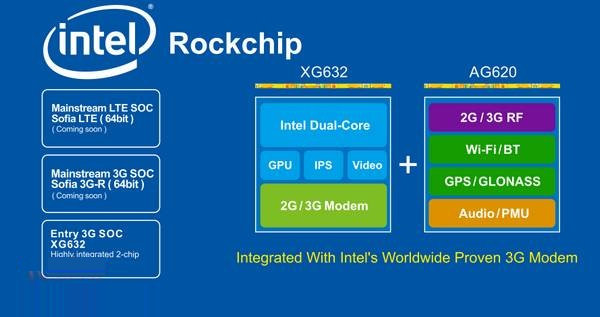Back in May, Intel and Rockchip announced a partnership to develop 3G and LTE “Sofia” SoC for mobile devices, a few months later, Rockchip VP posted a picture of dual core development board (6321 solution) on Weibo with Rockchip and Intel technology, and the companies have showcased solutions based on XMM 6321 during the Hong Kong Electronics Fair.
 Intel XMM 6321 appears to be a two-chip solution comprised of:
Intel XMM 6321 appears to be a two-chip solution comprised of:
- XG632 SoC with a dual core Intel processor, a GPU, ISP?, VPU and a 2G/3G modem
- Intel/Infineon AG620 Communication Combo with 2G/3G RF, Wi-Fi/BT, GPS, GLONASS and Audio/PMU.
XG632 will be the first processor from Intel and Rockchip collaboration, but it may not be part of “Sofia” family. with quad core 64-bit Sofia 3G-R and Sofia LTE SoCs coming at later date. XG632 is for entry-level smartphones (<$30) and tablets (<$40), whereas the upcoming Sofia SoCs will be seen in mainstream devices.
Charbax filmed Rockchip solutions at Hong Kong Electronics Fair, and he claims XG632 is actually a dual ARM Cortex A5 processor, but this is not consistent with the diagram above showing an “Intel Dual-Core”, and I could not confirm it with any other news sources, so wait and see.
Via AndroidPC.es and ARMdevices.net

Jean-Luc started CNX Software in 2010 as a part-time endeavor, before quitting his job as a software engineering manager, and starting to write daily news, and reviews full time later in 2011.
Support CNX Software! Donate via cryptocurrencies, become a Patron on Patreon, or purchase goods on Amazon or Aliexpress





I think possibly the whole ARM SoC might be designed by Intel’s In fine on branch and they didn’t know how to use it, they didn’t want to release it as an “Intel processor” ergo they made the deal with Rockchip “would you please sell our ARM processor with In fine on baseband for us? You can keep half the revenue” or something like that. Surely Intel as a giant, has teams designing ARM processors all the time, which they use to compare and to give the CEO a choice of going with ARM solutions any time he gives the OK. This may thus be Intel designed ARM SoC made at TSMC Fab sold under the Rockchip brand. There may be some x86 stuff Intel will brand by Rockchip later (perhaps low cost x86 solutions” but I Aldo think Intel will evaluate and design ARM 64bit with ARM version of Sofia LTE on-die, perhaps Fan at Intel Fan or do at TSMC.
@Charbax
I had read Intel had an ARM license, but I did not expect them to make ARM based mobile SoC, even via a third party. I did not think ARM would be pleased to have Intel look at their IP…, and this also opens the door to potential litigations…
Anyway, once the phones/tablets start selling, the truth will come out.
@cnxsoft
Well Intel did acquire Infineon and Infineon had some ARM SOCs on the way that would use their 3G modem. These are what’s know known as Sofia. They might have replaced the ARM cores with Atom ones but I’m 100% sure they can’t get AROM in 30-40 dollar devices.
Maybe Intel has some other X86 cores that they’re going to use ? The only thing that comes to mind is the Intel® Quark SoC X1000 Application Processor used by the Intel Galileo.
@cnxsoft
My guess is Intel has several ARM licences that are being kept secret (I think it is not mandatory for ARM and licensees to announce their licences, those licenses can stay secret for as long as the licensee wants them to remain secret, which I think is especially easy before large volumes of processors get shipped, basically what I think is Intel has all the ARM Licences they can get and they ship little if any ARM processors (only through their Infineon branch renamed Intel Mobile Communications branch)) and that ARM has no problem with Intel looking into their technology, and ARM knows Intel can look into it no matter what. I think it’s just that Infineon division of Intel (sorry I couldn’t type Infineon on the spell correct in my first comment), Infineon always made ARM based baseband stuff anyways, and the Infineon guys just kept on making ARM stuff since 2011 and here is one solution to try to see if Intel’s ARM baseband solution can try to compete a bit with MediaTek, Marvell and Spreadtrum, I don’t think Intel can afford to not do anything to test the markets all the time, when they’re such a big company, they have to put all their engineers to work and actually release some solutions as often as possible. I guess here though it may be a bit quiet in the way that this is an ARM based solution, so they ask Rockchip to brand it for them. And Rockchip is fine with that, if I’m Rockchip, I don’t mind working with Intel as long as Intel doesn’t at any point force Rockchip to sell some x86 stuff exclusively. Basically what Rockchip can get from this, potentially, is Intel might at some point Fab Rockchip’s ARM solutions on Intel’s 14nm technology and below, Rockchip gets one baseband solution which Rockchip is missing if the future of devices all are due to be LTE and 5G, Rockchip better try to get cosy with any and all baseband solutions that they can afford to work together with.